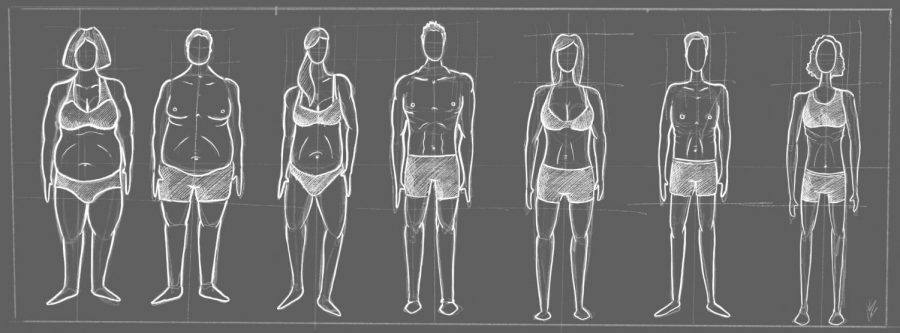The Palouse needs body diversity in fashion
Thrift shops carrying underrepresented clothing dependent on donations
nICK SANDIFER | The Daily Evergreen
Outdated expectations of body types have caused feelings of shame to men and women. All that matters is that you’re happy with how you look and feel.
February 15, 2018
Clutching a plastic bag filled with my clothes, I walked through the rows of small, medium and large blouses.
I slid the bag across the counter, and 20 minutes later they slid it right back toward me.
“Sorry, we can’t take these brands,” the friendly employee said, waving the next customer in line to come forward.
As far as I could tell, The Storm Cellar did not want anything to do with plus size clothing. I reached out to the owners to get to the bottom of their lack of diversity in sizes.
Austin Storm opened The Storm Cellar in Moscow eight years ago with his wife, Laura. People can donate their gently used clothes and reap a portion of the sales when they are resold to the public. Storm spoke about the shop’s diversity and their experiences running a secondhand clothing store in a small college town.
“You get the small-town vibe that is really special, and then you get a lot more exposure because of the universities,” Storm said. “They are a powerful means of diversity.”
But the diversity that both WSU and the University of Idaho bring to the store seems to be lacking in sizes outside the restrictive norm. Petite clothing, women’s plus size clothing and, most notably, men’s plus size clothing do not make large appearances within Storm’s store.
I had heard a rumor that The Storm Cellar consignment shop in Moscow does not accept brands like Maurices and Old Navy, due to their association with plus size clothing.
Storm said his lack of variety in sizes is not due to a reluctance to carry these clothes, but lack of contributions.
The Storm Cellar said they do not carry brands like Old Navy, Maurices and Forever 21 for fiscal reasons. They simply cannot compete with the low prices that these stores already offer, while still giving a portion of sales back to the donating patron.
Still, one could walk around The Storm Cellar and fail to see any representation of petite and plus size clothing.
Storm attempts to seek out underrepresented sizes and offer them at The Storm Cellar, hoping to create a circle of commerce and awareness that these types of clothing sales are encouraged.
According to a study conducted by WSU’s Deborah Christel, Apparel, Merchandising, Design and Textiles assistant professor, and Susan Dunn, AMDT graduate student, the average American woman wears a size 16-18, yet consumers rarely see that representation in popular culture. While plus sizes are very normal, the average American does not view extended sizes as the benchmark. This hurts consumers and the businesses that they frequent. Plus sizes need to be normalized in fashion.
It is wrong that the average American can look at a mannequin and feel like an outcast. Being healthy, mentally and physically, does not directly correspond with the tag on the back of your shirt.
Extended sizes do not have a wide representation in mainstream media, with an even more extreme disparity in male plus size portrayal. This lack of representation affects every form of fashion and consumption, trickling down all the way from designers to thrift shops.
The lack of normativity for plus size clothing in pop culture has created a stereotype that consignment shops won’t take extended sizes unless that’s their specialty.
This mentality needs to change. Plus size is normal, and shops like The Storm Cellar would thrive with more donations of underrepresented sizes. Storm will continue to proudly boast a variety of sizes as long as they come through his shop.










